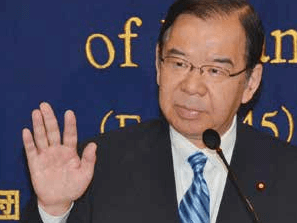Issue:
The president of Japan’s Communist Party took a (sometimes humorous) scalpel to the administration’s proposed security bills.

ONE OF THE GREAT anomalies of the Japanese political world is the continued existence in 2015 of a remarkably vibrant communist party. In the rest of the democratic world, communist parties either changed their names or else they disappeared altogether. But not in this country.
The Japan Communist Party remains proud of its name and its tradition. It is by far the oldest of the still functioning Japanese political parties, having been founded in 1922. That makes it more than three decades older than the Liberal Democratic Party. Moreover, the JCP is showing renewed electoral strength in the Abe era. In some public opinion polls it has been registering support levels that put it third, behind only the LDP and the DPJ. It is also the only opposition party that has been gaining seats since Shinzo Abe came to power. For example, in the unified local elections this April, the JCP saw advances that gave them representation in all 47 Japanese prefectural assemblies for the first time in their long history.
The gravity defying success of this opposition party and the Abe administration’s strong desire to reshape Japan’s postwar security policies made this a particularly opportune time for Party Chair Kazuo Shii to come to the Club to discuss his party’s views.
At the top of the agenda are the eleven bills that the Abe government calls the “Legislation for Peace and Security” and which the critics, including Shii, call the “War Bills.” Collectively, these bills, if passed, would drastically expand the Japanese government’s ability to deploy the Self Defense Forces to overseas missions, even in cooperation with foreign military actions.
With its long and tenacious commitment of support for the Japanese Constitution of 1947 and the pacifist ideals that it represents, the JCP is arguably the staunchest opponent of Abe’s security legislation. But since the ruling coalition of the LDP and Komeito holds firm majorities in both houses of the Diet, the main weapons that Shii and his colleagues can employ to defend their positions are the facts and logic that can devastate the Abe administration in parliamentary debate, and thus hopefully swing public opinion behind them.
“If an overwhelming majority of the public raises its voices against this legislation, ” Shii told the gathered journalists, “then the ruling coalition will not be able to force through its passage in spite of their parliamentary majority.”
Shii spent much of his opening statement making a series of incisive and often humorous observations about the arguments being employed by the Abe administration in support of their “War Bills.” He suggested that the government was forced to employ tortured logic and to create entirely new legal concepts that no one had ever heard of. He asserted that they couldn’t even be translated into English very effectively.
One example Shii gave was the administration’s concept of “rear area support,” which is apparently supposed to reassure the Japanese public that any operations that the Self Defense Forces would conduct together with foreign militaries would only take place at a safe distance from the hostilities.
“In English there is only the word ‘logistics’ roughly equivalent to the Japanese word heitan, which they don’t use. In the concept of logistics, however, there is no distinction between ‘rear’ and ‘forward’ support, but simply overall logistical support,” Shii observed.
The most amusing example that Shii posited was the Abe government’s concept of “the use of weapons.” The prime minister argued in Diet debate that should the Self Defense Forces come under attack while providing “rear area support” for a foreign military force, that it would be perfectly allowable that they have recourse to “the use of weapons” to defend themselves. At the same time, however, Prime Minister Abe staunchly refuses to acknowledge that “the use of weapons” can be regarded as a practical synonym for “the use of force” which is, of course, explicitly banned by Japan’s Constitution.
Shii noted playfully that he went to the Foreign Ministry and asked them if there was any place in international law or in the understanding of foreign nations that a distinction is drawn between “the use of weapons” and “the use of force” in military conflicts. Naturally, the Foreign Ministry confirmed that there was no such international understanding.
“We are debating concepts here that are used nowhere else in the world,” Shii commented.
In later parts of his presentation, Shii also highlighted problems he perceives in the subservience of Japanese foreign policy to the U.S., and in Abe’s unwillingness or inability to publicly acknowledge that Japan had ever committed a war of aggression or even “made a mistake” in launching the Pacific War. These factors, too, undermine trust in the government’s policy direction, he said.
Shii concluded, “The biggest problem with the Abe administration is that they only discuss military issues and they have absolutely no diplomatic vision. This sets up one national military against the other and leads to a cycle of negative developments.”
Michael Penn is president of the Shingetsu News Agency.

